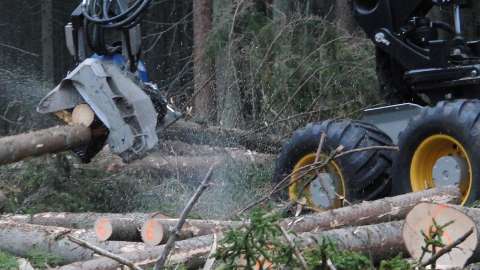Master’s thesis proposal: Harvester logging without end splits

The production of sawn wood starts already in the forest, as the harvester cuts the felled tree into logs of the most valuable dimensions. This moment controls much of the value added of a tree that has taken often over 100 years to produce.
Log end splitting is unfortunately frequent in the cut-to-length process of harvesting used in the Nordic countries. The splits are caused by the bending moment and the shear force imposed by the free end of the log during cutting. Log end splits bring about a considerable economic loss in the production of sawn wood. The splits are often detected late in the production process, and enforce truncation of logs, which leads to reduced yield and the production of less desired board dimensions. Measures to counteract the formation of end splits reduce losses and environmental impact and have a positive effect on profit in the production of sawn wood. This is particularly the case when board length is essential.
Different technical counter measures have been proposed, but none of them has gained commercial success. In order to find a functional and economically viable solution, it is necessary to enhance the theoretical understanding of the splitting process and how it is governed by controllable factors.
The aim of the master’s thesis is to develop a simulation model that predicts the risk for splitting as a function of mechanical load, bar geometry and cutting speed. An important part of the work is to review and develop existing models for splitting and cracking in anisotropic material such as wood.
The goal is to propose measures in terms of cutting angle, chain speed etc. in order to minimize the risk for log end splitting.
Your profile
You study a master’s programme in engineering science or applied physics, including mechanics, solid mechanics and scientific computing. A general interest in machines and automation is also beneficial. You are good at using your initiative and integrate knowledge from various fields.
Study period: spring 2019/running, 30 ECTS
Further information
If you have any questions, please contact Daniel Noreland. Apply with your CV, a personal letter and academic merits.
Welcome with your application!

